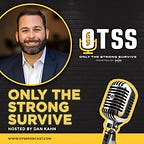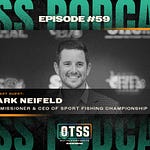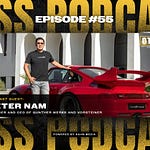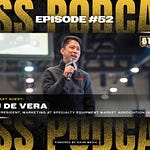Tim Parkhurst's love for the U.S. Marine Corps started early in life. After some difficulties in public school, he was enrolled in a private military high school that mirrored the Corps. The experience was life-changing, as Parkhurst knew he wanted to be a Marine from that point forward. Upon graduating, he quickly enlisted and became part of the elite Marine Corps Scout Snipers. He would go on to serve for 25 years in the Marines, with deployments across four conflicts.
Upon his retirement from the Corp, Parkhurst became involved in an all-volunteer Marine sniper association. However, he wanted to help preserve the Scout Snipers' 105-year-long history, honor its important legacy and build a memorial to its fallen members in Quantico, Virginia. Knowing that the mission would be beyond the bandwidth of volunteers, Parkhurst founded the Marine Scout Sniper Heritage Foundation. Consisting of a full-time staff, it is entirely dedicated to achieving those goals.
In this episode of the “Only The Strong Survive Podcast,” Parkhurst shares the lessons he learned from his service as a Scout Sniper. He also discusses with host Dan Kahn the need for the Marine Scout Sniper Heritage Foundation and other non-profit veteran-focused organizations like it. Click on the icon above to watch the entire interview, and here are our top takeaways:
Mission-driven people always need something to focus on.
The transition from military to civilian life is challenging for most veterans.
Small teams also need to contribute to larger organizations.
Keeping calm under pressure is a valuable skill for anyone.
Mission-Driven People Need Mission-Driven Organizations
There is no doubt that the U.S. Marine Corps is a mission-driven organization with equally driven members. Upon initially leaving the Marines, Parkhurst entered a darker period in his life without a mission to channel his energy on. That lost feeling and lack of focus led to Parkhurst re-enlisting in the Marines five years later. As he got closer to his final retirement, he knew he needed to still be part of a mission-driven organization. Fulfilling that need led him to become involved in non-profits and ultimately founding the Marine Scout Sniper Heritage Foundation.
“I was on a deployment in Afghanistan in 2010 and 2011, about three or four years before I retired, and it occurred to me that it is all about the mission. We are so mission-focused and driven in the military, and if I don’t have some kind of mission that means something to me when I get out, I am just going to flounder. That is really what happened to me the first time around,” said Parkhurst. “So I started thinking to myself that I would be proactive this time and find some type of non-profit or organization that I can give my time and effort to that seems worthy, adds value to the world, makes me feel better about myself and makes me feel like I am contributing.”
Becoming a Civilian is Tough
One of the reasons Parkhurst founded his non-profit is that he knew from first-hand experience how tough the transition to civilian life can be. Beyond the loss of a mission, there are a whole host of other issues that veterans often have to deal with after leaving the service. By honoring the legacy of the Scout Snipers, Parkhurst hopes that he can give former Marines a sense of being part of something much larger and find other veterans to confide in with their problems about switching to a civilian role.
“It is a problem that is never going to be completely mitigated. It will always be there. So no matter how much you prepare somebody who’s getting ready to separate ahead of time, they’re going to have the problem. A lot of it is determined by that individual's own personal disposition, their past history with mental health issues, stability and things like that. Quite frankly, a lot of guys come into the military with a lot of baggage already from their childhood,” says Parkhurst. “We are just a microcosm of society, so the military deals with that just like everybody in the civilian world.”
Going “Solo” Has Its Drawbacks
Marine Corps Scout Snipers are unique because they operate independently in a two-man team with minimal supervision. That ability to broadly execute missions on their own contrasts with the more rigid and traditional military command structures soldiers often deal with. However, just like in business, continually operating on your own or in micro teams has drawbacks and can make being part of the “bigger picture” more difficult.
“You get overlooked when it comes to larger picture things. When you are just off training on your own, you are just training individual skills, but what about skills in support of a company, which is maybe 150 men, or skills in support of a battalion, which is a thousand guys?” says Parkhurst. “Different-sized operations require different skill sets and different techniques. If you don’t practice them, you can’t get good at them.”
Equanimity is a Virtue
Any sniper is rigorously taught the importance of equanimity. Marine Corps Scout Snipers are put into highly stressful situations, so the ability to remain calm and make composed decisions is vital. While business leaders aren’t deciding the perfect time to take a shot with a sniper rifle, their ability to keep calm is just as important. Being rash with decisions and not thinking them through can be fatal to a sniper but also the downfall of a business.
“When I went through sniper school, the big catchword was equanimity. Equanimity is essentially the ability to keep your cool under pressure, not make rash decisions and think things through. Don’t think too long, be decisive and make a decision, but always think,” says Parkhurst. “You have to think about equanimity and practice it to get good at it. Just having that word in my head and knowing that it is there and something that I should strive for has helped me in those times when it mattered to actually be able to do that just enough to be somewhat successful.”












